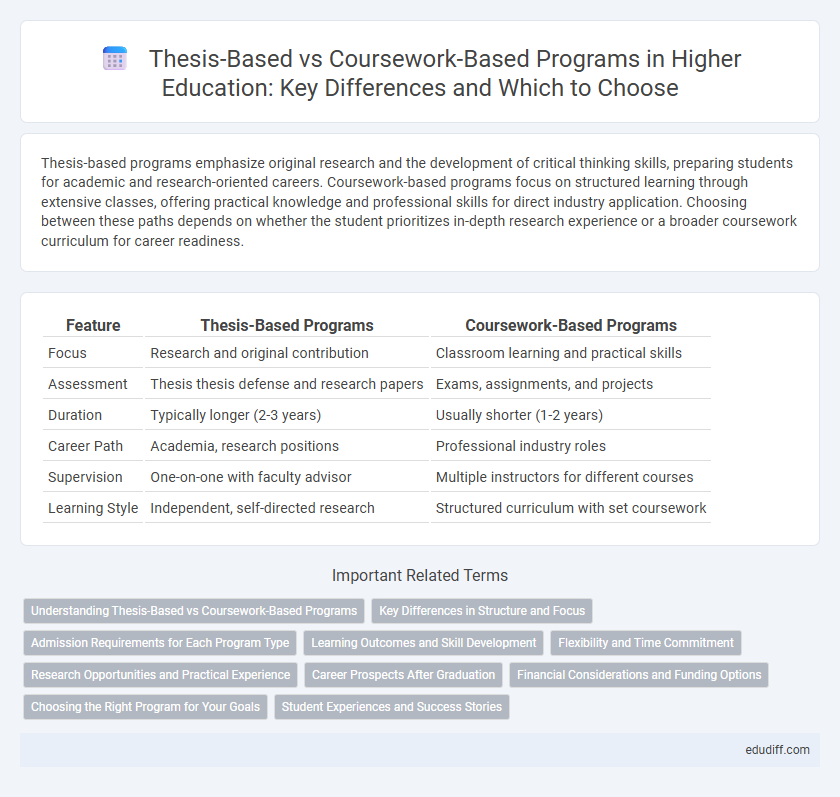Thesis-based programs emphasize original research and the development of critical thinking skills, preparing students for academic and research-oriented careers. Coursework-based programs focus on structured learning through extensive classes, offering practical knowledge and professional skills for direct industry application. Choosing between these paths depends on whether the student prioritizes in-depth research experience or a broader coursework curriculum for career readiness.
Table of Comparison
| Feature | Thesis-Based Programs | Coursework-Based Programs |
|---|---|---|
| Focus | Research and original contribution | Classroom learning and practical skills |
| Assessment | Thesis thesis defense and research papers | Exams, assignments, and projects |
| Duration | Typically longer (2-3 years) | Usually shorter (1-2 years) |
| Career Path | Academia, research positions | Professional industry roles |
| Supervision | One-on-one with faculty advisor | Multiple instructors for different courses |
| Learning Style | Independent, self-directed research | Structured curriculum with set coursework |
Understanding Thesis-Based vs Coursework-Based Programs
Thesis-based programs emphasize original research and critical analysis, allowing students to contribute new knowledge within their field, often requiring the completion of a substantial written thesis. Coursework-based programs focus on structured learning through lectures, assignments, and exams, providing a broader range of subjects and practical skills without a primary research component. Understanding the differences helps students align their graduate education with career goals, whether pursuing academic research or professional practice.
Key Differences in Structure and Focus
Thesis-based programs emphasize original research and the development of specialized knowledge through a comprehensive thesis, fostering critical thinking and analytical skills. Coursework-based programs prioritize structured learning via a series of classes, promoting breadth in subject matter and practical application. The key difference lies in thesis-based tracks requiring a substantial research project, while coursework-based tracks focus on completing diverse courses for skill acquisition.
Admission Requirements for Each Program Type
Thesis-based programs typically require applicants to have a strong academic background, often including a higher GPA and letters of recommendation that emphasize research potential, while coursework-based programs may place more emphasis on relevant professional experience and completed prerequisite courses. Admission to thesis-based programs usually involves submitting a detailed research proposal, demonstrating the candidate's readiness for independent scholarly work, whereas coursework-based programs focus on a well-rounded application showcasing academic performance and practical skills. Standardized test scores such as the GRE or GMAT may be required for both, but thesis-based tracks often demand higher scores to reflect analytical and research abilities.
Learning Outcomes and Skill Development
Thesis-based programs emphasize deep research skills, critical thinking, and advanced problem-solving abilities, fostering expertise in generating original knowledge. Coursework-based programs prioritize practical application, foundational knowledge, and discipline-specific skills through structured classes and assessments. Both approaches cultivate complementary competencies, with thesis-based paths enhancing analytical depth and coursework-based tracks strengthening professional and technical proficiencies.
Flexibility and Time Commitment
Thesis-based programs typically demand a significant time commitment focused on independent research, offering flexibility in selecting topics but requiring self-discipline to meet deadlines. Coursework-based programs provide structured schedules with fixed class times and assignments, allowing for more predictable time management but less autonomy in topic choice. Students prioritizing flexibility may favor thesis-based options, while those seeking clear timelines and guided learning often prefer coursework-based tracks.
Research Opportunities and Practical Experience
Thesis-based programs prioritize deep research opportunities, allowing students to develop specialized expertise through original investigations and close mentorship from faculty. Coursework-based programs emphasize practical experience by integrating industry-relevant projects and hands-on learning, equipping students with applicable skills for immediate professional use. Both pathways offer distinct advantages, with thesis programs enhancing academic research capabilities and coursework programs fostering practical problem-solving abilities.
Career Prospects After Graduation
Thesis-based programs often enhance career prospects by demonstrating strong research skills and the ability to conduct independent projects, appealing to employers in academia, research institutions, and specialized industries. Coursework-based programs provide practical knowledge and diverse skill sets, making graduates versatile for roles in corporate sectors, government agencies, and professional services. Both pathways develop competencies valued in different professional environments, influencing career trajectories based on industry demands and individual goals.
Financial Considerations and Funding Options
Thesis-based programs often offer more funding opportunities through research assistantships and stipends, reducing overall tuition costs and living expenses. Coursework-based programs typically rely on scholarships and personal financing, making them potentially more expensive for students without external funding. Understanding the financial investment and available funding options is crucial for students when choosing between thesis-based and coursework-based graduate programs.
Choosing the Right Program for Your Goals
Thesis-based programs emphasize original research and critical analysis, ideal for students pursuing academic or research-oriented careers. Coursework-based programs focus on practical skills and comprehensive subject knowledge, suited for those seeking professional advancement or broad expertise. Selecting the right program depends on your long-term goals, whether you prioritize innovation and contribution to knowledge or skill application and career flexibility.
Student Experiences and Success Stories
Thesis-based programs immerse students in independent research, fostering critical thinking and deep subject mastery that often leads to publications and academic career opportunities. Coursework-based programs provide structured learning with diverse subjects, enhancing practical skills and knowledge application, which suits students aiming for industry roles. Success stories from thesis-based students highlight breakthroughs in innovation, while coursework-based alumni excel in job placements and versatility across various sectors.
thesis-based programs vs coursework-based programs Infographic

 edudiff.com
edudiff.com